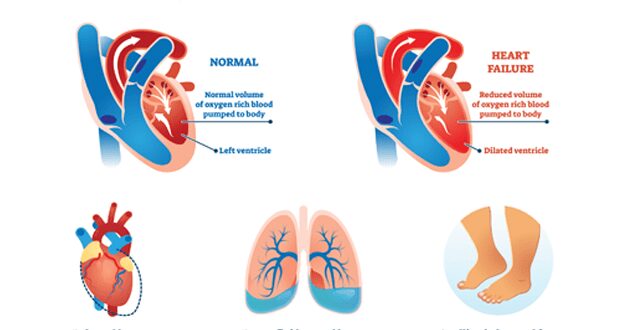Congestive heart failure or CHF is a condition in which a patient’s heart is not able to pump blood efficiently.
The core function of pumping blood stresses the heart because of the underlying factors that are usually the triggers that flare up the condition.
The muscles around the heart weaken over time and the simple act of pumping blood to supply bodily functions stresses the heart further.
This condition if left unattended can lead to cardiac arrest and in some cases can cause a multi-organ failure.
Overview of CHF patient symptoms

A person with a congestive heart will find it difficult to pump the oxygenated blood that is demanded by the rest of the body. This happens because of weak muscles around the heart.
As a result, the blood is pumped back into the heart, leading to congestion and enough oxygenated blood does not reach the rest of the body.
The human body tries to adjust to the medical condition in various methods. In CHF patients, the heart will try to beat faster to complete the process of pumping blood.
However, over the long run, the muscles will become weak, and the extra effort will cause breathlessness and palpitations.
The heart enlarges to create room for blood. Fluid fills in the lungs and causes cough and shortness of breath.
When kidneys receive less blood, water and sodium levels increase. This can lead to lung and kidney failure. With or without treatment, a congestive heart condition is a progressive disease that will only get worse with time.
Treatments can delay the progression but not stop it altogether. Despite treatments, a great deal of the success of the treatment of CHF patients depends on the healthy choices they make.
So it is imperative to deploy methods for CHF patient education, so that they are aware of the means to take care of their health.
Awareness for the prevention of CHF

Prevention is the best cure, and this is more so in conditions where even treatment has a limited scope of reversibility to a healthy point in a person’s life.
The conditions that often lead to congestive heart failure are lifestyle oriented.
A minuscule number of patients who suffer from congestive heart disease have preexisting conditions that are congenital, and rest is acquired due to poor health habits.
If patients are educated by their physicians using various methods for effective approaches, then most patients can slow down the progress of their ailments and live till a prime age without trouble.
Here are areas that need to be stressed during CHF patient education that will impact their health in future years:
• Importance of a wholesome diet

If we glance at our plates, there is a high chance that most of us are eating high-sodium processed food during meal times. It is time that people start noting the fact that diet plays a vital role in our health.
If we choose whole foods that are rich in fiber, eat fresh fruits and vegetables, balance out the major macros like protein, carbohydrates, and essential fats, and remember to eat in a manner that is in tandem with bio-clock, then we tend to keep our gut happy. As a result, the essential nutrients are absorbed, and energy levels are increased.
This means that people may not be able to reverse a health condition in totality but they can slow down the progression through a balanced diet that includes fresh food that is locally and seasonally acquired.
• Exercise

Exercise helps the heart condition by lowering blood pressure. Aerobic and cardio exercises help the muscles draw the blood that is circulating through the body.
This simple act reduces the strain on the heart to pump more blood. Exercise has a domino effect on the heart and overall health of a person- lower stress, better sleep, a positive approach to life in general and better immunity.
• Quit addictions

Smoking and any related addiction including substance abuse, impact the heart and other vital organs.
When any other organ fails due to continued abuse, it ultimately affects the health of the heart. So quitting smoking and other substances like alcohol and cannabis consumption are imperative for heart health
Summing-up:
A CHF patient can lead a normal life through lifestyle changes and regular check-ups with the physician. It is a matter of choice and education.
 Vermont Republic Second Vermont Republic
Vermont Republic Second Vermont Republic




